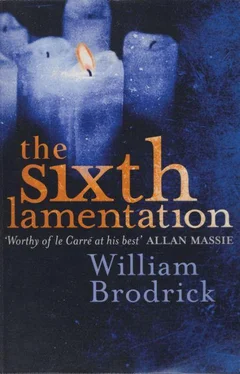William Brodrick - The Sixth Lamentation
Здесь есть возможность читать онлайн «William Brodrick - The Sixth Lamentation» весь текст электронной книги совершенно бесплатно (целиком полную версию без сокращений). В некоторых случаях можно слушать аудио, скачать через торрент в формате fb2 и присутствует краткое содержание. Жанр: Триллер, на английском языке. Описание произведения, (предисловие) а так же отзывы посетителей доступны на портале библиотеки ЛибКат.
- Название:The Sixth Lamentation
- Автор:
- Жанр:
- Год:неизвестен
- ISBN:нет данных
- Рейтинг книги:5 / 5. Голосов: 1
-
Избранное:Добавить в избранное
- Отзывы:
-
Ваша оценка:
- 100
- 1
- 2
- 3
- 4
- 5
The Sixth Lamentation: краткое содержание, описание и аннотация
Предлагаем к чтению аннотацию, описание, краткое содержание или предисловие (зависит от того, что написал сам автор книги «The Sixth Lamentation»). Если вы не нашли необходимую информацию о книге — напишите в комментариях, мы постараемся отыскать её.
The Sixth Lamentation — читать онлайн бесплатно полную книгу (весь текст) целиком
Ниже представлен текст книги, разбитый по страницам. Система сохранения места последней прочитанной страницы, позволяет с удобством читать онлайн бесплатно книгу «The Sixth Lamentation», без необходимости каждый раз заново искать на чём Вы остановились. Поставьте закладку, и сможете в любой момент перейти на страницу, на которой закончили чтение.
Интервал:
Закладка:
‘Yes. And to think… I made my name in a field of learning that is known as the age of patronage.’
Salomon Lachaise watched his dangling feet, carefully trailing the soles of his shoes against the heavy pull of water. Blackened silver spurted either side at every sweeping touch.
Anselm said, tentatively ‘Why you?’
Very slowly Salomon Lachaise said, ‘I was the last child saved by The Round Table, taken to safety by Agnes Aubret just before her arrest.’
Anselm turned and scrutinised the face of his companion. It was a miracle of calm, a screen of chalk that would fall into powder if touched. Uncomprehending, Anselm said, ‘He must have seen your existence as a salving of conscience.’
‘My entire academic life rests upon contamination. Everything 1 have achieved rises from poison, bright flowers out of filth. I shall never practise my art again.
Anselm struggled to remonstrate, ‘But surely…’ He floundered, lacking conviction, for he knew that the most costly decisions are often not made — they happen.
‘I did not contact Fougeres and my mother thought that I had taken her advice. Shortly afterwards she died, peacefully. And while that brought grief, it set me free.’
‘To do what?’ Anselm had sensed something specific… something crucial.
‘Mr Bremer was a meticulous man, a keeper of detailed records which he never destroyed. By chance there had once been an error in the transfer of funds from the solicitor in Germany. to him. In sorting out the tangle he’d learned the name of the client. At my request he dug out his old papers and there it was… Nightingale.’
‘And you passed that on to Pascal Fougeres?’ asked Anselm.
‘Yes. When that man claimed sanctuary.’ I took early retirement and followed his route of escape, from Paris to Les Moineaux. I had an inkling he’d somehow taken the same route as my mother. Then I came here, to Larkwood. After that it was a matter of waiting for the outcome of the trial.’ He breathed deeply, like one bent over.’ preparing to heave a rock to one side. He said, ‘I waited for him to speak, to hear what he had to say to those he had robbed. But in the end he said nothing, and they freed him. He was exactly what he appeared to be, only the jury had a doubt. The moment I’d waited for had come… and I did not want it. I told an usher I wanted to see him and I gave my name.
Again he ran his feet upon the surface of the stream, watching the sweeping cuts in the silvery rush, opened up, now closed, then opened up again. Salomon Lachaise described how he was shown through to a room rather like a post office counter.
A window of thick glass lay seated in the wall. Beneath, on each side, was a wide sill — a table passing through the divide — and a chair.
‘A door opened and suddenly there he was. For a long while I just looked at him, each line upon his face, the nails upon his fingers. He raised a hand, putting it against the glass.’
Schwermann had spoken first across the divide:
‘I didn’t realise it was you, in the woods…’
‘Yes.’
‘I can hardly believe that you are here, that you have come. Gratitude and fearful wonder loosened his drawn features.
‘Yes, I have come.
‘How did you find out?’
‘I am here, that is all that matters.’
‘I managed to save you, do you know that?’
‘Yes, I do.’
‘After I got away and had enough money I had you traced.’ I gave what I could, I’ve followed your success…’ The appeal sought recognition, appreciation.
‘Yes, I understand that.’
‘I’ve had a family… a daughter… a grandson, but through all these years I have never forgotten you… I have thought of you, wondering how you have grown.
‘Yes, I am sure.
‘You were one of the reasons my life was worth anything.’
‘Yes.’
‘And now, when all the others have gone, it is you that has come to see me… I am overwhelmed…’
Perhaps it was the crippling tension of the moment, perhaps it was his saturation in culture, but in a flash Salomon Lachaise suddenly remembered a devastating passage from Virgil’s Aeneid, where Aeneas towers triumphant over the fallen Turnus, a man of great strength, having defeated him in single combat; Aeneas raises his sword to carry out the execution, but Turnus pleads for his life, for the sake of his father; Aeneas checks the fall of his arm and hesitates… but then his eye catches the belt of Pallas, a trophy upon the shoulder of Turnus… Pallas, his dearest friend, slain without mercy…
Salomon Lachaise said, his voice cracked and low: ‘What of the others, my mother’s family the thousands, the sons and daughters-’
‘There was nothing I could do.’
‘You did a great deal:
The old man wheedled, as if for the hundredth time, ‘I had no choice.’
‘Yes, you did. You have forgotten too much.’
‘Please, Salomon, listen… can’t you forgive…’ The pleading became a wail.
‘I do not have that power. And neither does God. It belongs to those you abandoned. Now hear me.
Schwermann became instantly still, as though his heart had ceased to beat. He simply breathed, a functioning suddenly foreign to his waiting, expectant body Salomon Lachaise stood up and said: ‘I raise in my hands the dust from which you were made and I cast it to the wind. May you never be remembered, either under the sun or at its setting.’
He turned away from the dividing glass. And from the prisoner on the other side, soon to be freed, came the sound of a withered, resentful moan.
Salomon Lachaise had finished speaking. The wild chase of water beneath their feet grew loud. Anselm repeated what he’d read in the papers:
‘The police found capsules in two of his jackets, sewn into the same corner below the left pocket, with a loose thread ready to be pulled when needed.’
‘So I understand.’
‘Presumably they were taken out and put back after every visit to the dry cleaner’s.’
‘Yes, I expect you are right.’
Anselm thought of the private ritual, the unpicking and the sewing up over the years, the constant preparedness to escape a judgment imposed by anyone other than himself. Before Anselm could pursue his reflections, Salomon Lachaise said, with closing authority: ‘I shall never talk of him again.’
As at a signal, they both clambered on to their knees and stood, Anselm helping his companion gain balance. Strolling back to The Hermitage, Anselm said, ‘What will you do now?’
‘Travel. I want to keep moving. I have no commitments, no dependants.’
‘You’ll remain in Geneva?’
‘Yes. As much as I have left the University, it remains something of a home. Anyway’ — he smiled brightly — ‘I intend to arrange a small exhibition of young Max’s paintings. Have you seen them?’
‘No.’
‘You should. They possess alarming innocence. I shall try to use the ignominy of his background to his advantage. Otherwise it will remain a curse.
‘That is kind.’
‘Nothing done for pleasure is kind.’
They reached The Hermitage shack, and Anselm made to amble back to the Priory. Pointing at the open door, Salomon Lachaise said, ‘Can you join me for a final glass of port? I never go anywhere without a bottle.’
They sat on wobbling wooden chairs, sipping in silence, until Anselm said, ‘Would you like to meet Agnes Aubret?’
Salomon Lachaise, with tears in his eyes, could not reply.
Chapter Forty-Seven
1
Lucy met her father in the noble gardens of Gray’s Inn. As they entered, she pointed at the stone beasts on the gate columns. ‘Griffins,’ said her father knowledgably. ‘Protectors of paradise. Don’t they teach you anything about myths these days?’
Читать дальшеИнтервал:
Закладка:
Похожие книги на «The Sixth Lamentation»
Представляем Вашему вниманию похожие книги на «The Sixth Lamentation» списком для выбора. Мы отобрали схожую по названию и смыслу литературу в надежде предоставить читателям больше вариантов отыскать новые, интересные, ещё непрочитанные произведения.
Обсуждение, отзывы о книге «The Sixth Lamentation» и просто собственные мнения читателей. Оставьте ваши комментарии, напишите, что Вы думаете о произведении, его смысле или главных героях. Укажите что конкретно понравилось, а что нет, и почему Вы так считаете.












